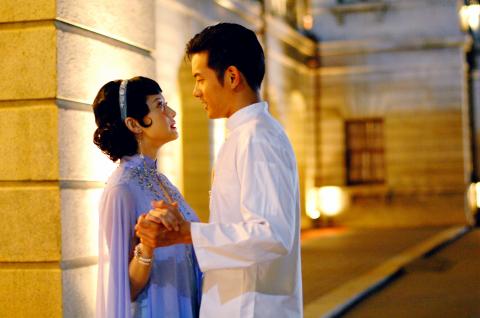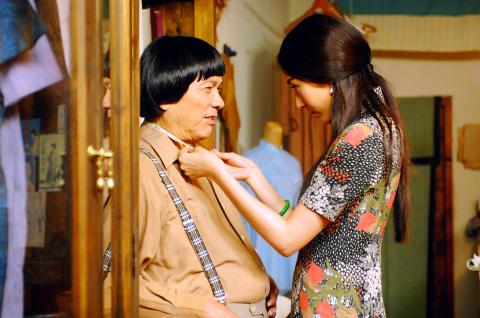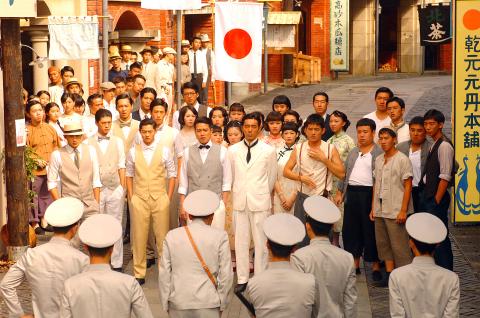After his feature debut Night Market Hero (雞排英雄), which grossed NT$140 million in 2011, blockbuster maker Yeh Tien-lun (葉天倫) returns with Twa Tiu Tiann (大稻埕), a film that aims to be grander and much larger in scope. The movie mixes fantasy and history to tell the story of a young man travelling back in time to 1920s Taiwan which was then under Japanese colonial rule. It is a melodramatic comedy punctuated with big emotions, and through its well-rendered time-travel conceit, the film delivers a rare portrait of Taipei as a city with a long history, affording its residents time travel into the past when one could bump into Chiang Wei-shui (蔣渭水), an important figure in Taiwan’s resistance to Japanese colonial rule, while walking down a Dadaocheng (大稻埕) street.
The film opens in present-day Taipei, where college student Jack, played by television show host-turned-actor Chris Wang (宥勝), whiles away his days chasing girls and hanging out with friends. To the gang of young lads, the history lessons taught by Professor P (Chu Ko Liang, 豬哥亮) couldn’t be more different from their easygoing lifestyle.
One day, during a field trip to a museum in western Taipei’s Dadaocheng area, Jack notices a painting on display. It is Festival on South Street (南街殷賑), a painting of iconic Dihua Street (迪化街)) by Kuo Hsueh-hu (郭雪湖), a pioneer of modern art in Taiwan. Encouraged by Professor P, Jack takes a photograph of the work. Suddenly, everything in the painting comes to life, and Jack finds himself transported back to 1920s Dadaocheng, which at the time was a major trading hub for tea, textiles, herbal medicines and many other goods.

Photo Courtesy of Swallow Wings
Bewildered, Jack is taken in by Ginger (Sonia Sui, 隋棠), a sassy Manchu woman who fled to Taiwan after the Qing Dynasty crumbled and has since run a textile shop in the area. To his surprise, Jack finds among Ginger’s helpers his history professor, who discovered the painting’s portal back in time and has been returning to the past constantly to court Ginger.
Jack’s eagerness to return to the 21st century dissipates when he meets young Taiwanese geisha Rose (Jian Man-shu, 簡嫚書). While love blossoms between Jack and Rose, they befriend Chiang Wei-shui (Lee Li-jen, 李李仁) and are drawn into the campaign for democracy led by Chiang and other Taiwanese civil rights activists. Soon Jack, Professor P and their friends become involved in Chiang’s effort to petition the colonial government for the creation of an elected representative body in front of the Japanese Crown Prince Hirohito, who visited Taiwan in 1923.
Over the two-hour screening time, Yeh delicately weaves Taiwanese history into a work of holiday entertainment packed with romance and humor. The plot involving the lead character coming to terms with the present through his reconciliation with the past serves as an eloquent metaphor and is passably carried out by rising actor Wang. The star of the show, however, is Taiwanese comedian Chu Ko Liang, who appears genuinely funny with his offbeat humor and makes a surprisingly lively pair with model-turned-actress Sui.

Photo Courtesy of Swallow Wings
Unfortunately, the movie is largely let down by sloppy and lazy scriptwriting. Sufficient details, motivation and narrative coherence are often absent. Embarrassingly cliched characters abound; a speech by Chiang is lifeless in its excessive sentimentality. The absence of a film studio in Taiwan, along with the needed infrastructure and talent to produce period films, is also apparent in this movie as portraits of historical grandeur are sometimes reduced to the scale of a television drama.
An aspect of Twa Tiu Tiann worth mentioning is the playful rendition Moving Forward (向前行). Though the uplifting mood of the song, recorded in 1990, is hardly in tune with the sentiments of present-day Taiwan, it makes a fitting accompaniment to the movie’s sanguine, if not overly saccharine, vision.

Photo Courtesy of Swallow Wings

In recent weeks the Trump Administration has been demanding that Taiwan transfer half of its chip manufacturing to the US. In an interview with NewsNation, US Secretary of Commerce Howard Lutnick said that the US would need 50 percent of domestic chip production to protect Taiwan. He stated, discussing Taiwan’s chip production: “My argument to them was, well, if you have 95 percent, how am I gonna get it to protect you? You’re going to put it on a plane? You’re going to put it on a boat?” The stench of the Trump Administration’s mafia-style notions of “protection” was strong

Every now and then, it’s nice to just point somewhere on a map and head out with no plan. In Taiwan, where convenience reigns, food options are plentiful and people are generally friendly and helpful, this type of trip is that much easier to pull off. One day last November, a spur-of-the-moment day hike in the hills of Chiayi County turned into a surprisingly memorable experience that impressed on me once again how fortunate we all are to call this island home. The scenery I walked through that day — a mix of forest and farms reaching up into the clouds

With one week left until election day, the drama is high in the race for the Chinese Nationalist Party (KMT) chair. The race is still potentially wide open between the three frontrunners. The most accurate poll is done by Apollo Survey & Research Co (艾普羅民調公司), which was conducted a week and a half ago with two-thirds of the respondents party members, who are the only ones eligible to vote. For details on the candidates, check the Oct. 4 edition of this column, “A look at the KMT chair candidates” on page 12. The popular frontrunner was 56-year-old Cheng Li-wun (鄭麗文)

Oct. 13 to Oct. 19 When ordered to resign from her teaching position in June 1928 due to her husband’s anti-colonial activities, Lin Shih-hao (林氏好) refused to back down. The next day, she still showed up at Tainan Second Preschool, where she was warned that she would be fired if she didn’t comply. Lin continued to ignore the orders and was eventually let go without severance — even losing her pay for that month. Rather than despairing, she found a non-government job and even joined her husband Lu Ping-ting’s (盧丙丁) non-violent resistance and labor rights movements. When the government’s 1931 crackdown